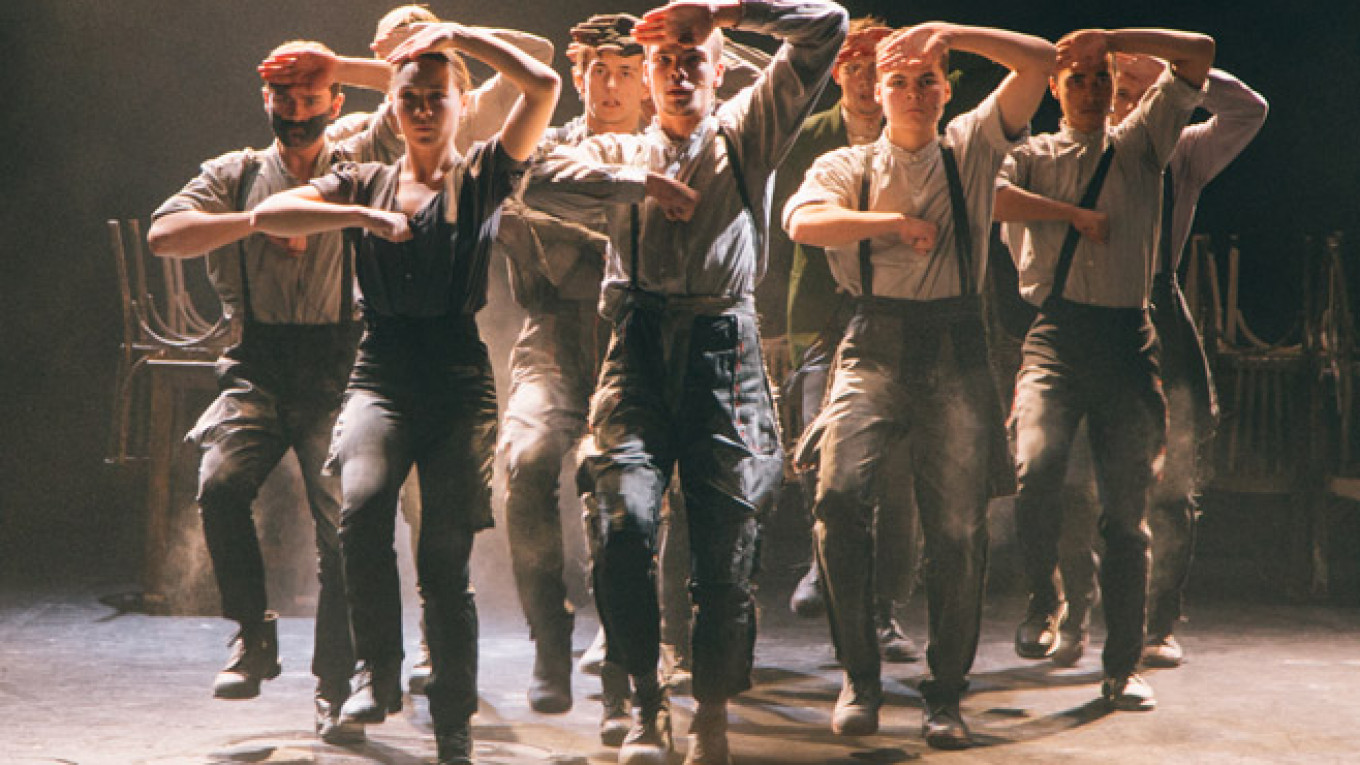Isaac Babel is one of the most enigmatic writers not only of the early Soviet era, but in all of Russian literature. He wrote plenty to be included among the greats, but the truth is that most of his important works fit into two volumes. There is a very complete four-volume collection available.
Although he wrote a couple of plays, Babel, like Anton Chekhov, was a born writer of short prose. He was a writer of exact phrases, tough observations and absolute honesty.
Unlike Chekhov, he tended to train his withering eye on atrocities. His stories of pogroms and the Civil War in and around Odessa bear astonishing witness to the commonplace nature of violence and evil. Paradoxically, they impart the beauty of art to things that cannot possibly be beautiful in any way.
Enter the Dmitry Brusnikin Studio of the Moscow Art Theater, that group of overachieving acting students who have created such a stir in the Moscow theater community over the last two seasons. This time, under the direction of Maxim Didenko, they have unleashed "The Red Cavalry," an in-yer-face interpretation of Isaac Babel stories. It plays from time to time at the Meyerhold Center.
Didenko, who also choreographed with Ilya Oshi and Irina Galushkina, does not avoid Babel's words by any stretch of the imagination, but he does move them to a different plane. Sometimes they are projected on the back wall, sometimes they are spoken, although not really heard. That is intended. This is a visual, emotional, sonic, physical mash-up that translates Babel's often merciless, but candid, vision into the language of images.
It is an episodic piece that is broken down into "pages," each of which tells a new story, sometimes with characters repeated, sometimes not.
In a way that is reminiscent of news stories we see and hear today, the action sweeps in zigzags northward across Ukraine, beginning in Odessa. Some of the towns bear names we know well: Novorossiisk, Zhitomir, Berdichev. Here crimes are perpetrated, murders committed, plans for vengeance hatched, and hopes for remaining out of the line of fire dashed.
Don't expect a straightforward story from Didenko's "Red Cavalry." He's not interested in you contemplating anything, at least until you leave the theater with your ears ringing and your eyes still dilated. He wants you to experience Babel, to experience war and mayhem on Slavic lands. Having done that, you can go think about it later.
The scenes, or pages, depict most everything you would expect of a tale of war: perfidy, violence, grief, fury, fear. A father is murdered, and a daughter's wailing song of lament transforms into a rhythmic, blood-curdling scream.
There is a narrator, a kind of witness and participant, who assures us that he is telling the truth. What the truth is, however, is anyone's guess. The narrator is as caught up in the violence and chaos as much as anyone else.
Phrases are fired into the air like bullets. "I love the Revolution." "Poles kill Jews." "Others kill Poles." "The Revolution does good." "But good people don't kill."
Where does one go after a revelation like that? Puffs of talc spread across the stage, laying low everyone as though they have been sprayed with poison gas.
Surely it is no coincidence that the further we move into this chaotic, but tightly controlled, performance, the less clothes attempt to cover the bodies on stage. Love trysts, rapes, mass graves — they all begin to merge into one, although each scene depicting each is directed, choreographed and acted with a precision and depth that one simply would not expect to see in a group of students.
Naked bodies — dragged, attacked, dancing, hiding — parade across the stage. Woman and man in their primal state — gorgeous and oppressively vulnerable — either withstand the onslaught of violence, or they do not. Some are chosen for one purpose, others for others.
At two hours and 15 minutes without a break, this show — for a brief moment — raises the question: Is it too long? And then you think: Isn't war too long? Any mass extermination? Any single execution? Any violent death of a parent or child?
No. This "Red Cavalry" is right on target.
"The Red Cavalry" (Konarmia) plays Dec. 2 at 7 p.m. at the Meyerhold Center, located at 23 Novoslobodskaya Ulitsa. Metro Mendeleyevskaya. 495-363-1048. meyerhold.ru. Running time: 2 hours, 15 minutes.
Contact the author at [email protected]
A Message from The Moscow Times:
Dear readers,
We are facing unprecedented challenges. Russia's Prosecutor General's Office has designated The Moscow Times as an "undesirable" organization, criminalizing our work and putting our staff at risk of prosecution. This follows our earlier unjust labeling as a "foreign agent."
These actions are direct attempts to silence independent journalism in Russia. The authorities claim our work "discredits the decisions of the Russian leadership." We see things differently: we strive to provide accurate, unbiased reporting on Russia.
We, the journalists of The Moscow Times, refuse to be silenced. But to continue our work, we need your help.
Your support, no matter how small, makes a world of difference. If you can, please support us monthly starting from just $2. It's quick to set up, and every contribution makes a significant impact.
By supporting The Moscow Times, you're defending open, independent journalism in the face of repression. Thank you for standing with us.
Remind me later.







